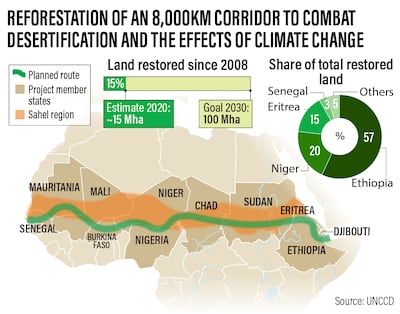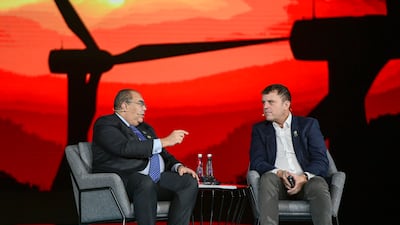Israel has announced it will allot its contributions to the world climate fund to Africa's Great Green Wall programme to rehabilitate large parts of the Sahel and combat the impact of rising temperatures on the planet.
The Green Climate Fund (GFC) – the world’s largest such fund – was set up under United Nations' climate change negotiations to help channel money needed by poor states to meet their targets to reduce carbon emissions, develop cleaner energy sources and adjust to a warming world.
German officials on Thursday announced a meeting in Bonn had drawn commitments of $9.3 billion in new donations.
Israel's decision to back the African Union project in the Sahel will draw on the country's own climate development solutions.
"We are ready to work with a GCF to ensure that our pledge is used to support the most effective and impactful projects possible," a statement said. "In Israel, we see this pledge as a first step, the beginning of a meaningful partnership between Mashav, Israel's International Development Co-operation Agency and indeed the whole of the Israeli international development community and the GCF.
"Together we can promote sustainable development to create and introduce innovative solutions to climate change challenges."
Specific pledges
Several countries deferred announcements of specific pledges, including the US and Sweden, but the highlight in the former West German capital city was the UK announcement of grants of $2 billion.
Mahmoud Mohieldin, who oversaw Thursday's pledging session, said the willingness to back the fund was the most important aspect of the conference.
"I would like to reiterate the announcements made just now, [plus] more to come, are crucial contributions for the implementation of critical work in climate action through the GCF. We have taken another concrete step together to halt the climate crisis," he said.
"These are contributions from the people who have these allocations to other people around the world, in the spirit of collaboration, partnership and securing the implementation of the Paris Agreement for the planet."

The GCF has approved $11 billion worth of projects in 129 countries, a progress report in April said. A total $3 billion has been disbursed.
The Great Green Wall is focused on efforts to restore 100 million hectares of desert south of the Sahara, including in Senegal in the west and Djibouti in the east. With a 2030 target for establishing the green footprint, the plans have changed from the original concept of a 7,000km wall of trees.
Speaking in New York last month, Majid Al Suwaidi, director general-designate of Cop28, encouraged a step change in the UN-backed GCF to meet climate challenges ahead of the global conference that opens in Dubai on November 30.

"The GCF takes seven years to deploy capital to developing countries, that can't be acceptable," he said.
"The World Bank and other international financial institutions are not supporting green investment at scale for various complicated reasons, whether it be around risk or risk appetite or credit ratings ... capital is not flowing."
Mafalda Duarte, the head of the climate fund, raised the prospect of teaming up with a wider range of organisations, supporting projects and programmes "that are closer to the communities and to the realities on the ground".
"My premise is if we are to achieve the [climate] goals, we have to mobilise as much action as possible and therefore we can't rely on a network of a few dozen institutions – we really need to work with a much broader network," she said before this week's pledging conference.
"That means, for example, channelling more resources from the GCF to support local commercial banks and businesses in places such as Kenya that are providing credit to farmers to buy clean energy equipment such as solar-powered irrigation or to switch to greener practices," said Ms Duarte.
The GCF has a roughly even split between helping countries cut their planet-heating emissions by adopting clean energy, and efforts to adapt to more extreme weather and rising seas in front line countries.


